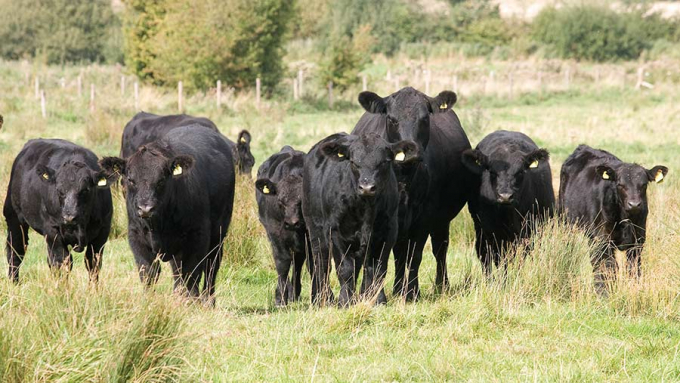November 28, 2025 | 03:25 GMT +7
November 28, 2025 | 03:25 GMT +7
Hotline: 0913.378.918
November 28, 2025 | 03:25 GMT +7
Hotline: 0913.378.918

Beef prices should be similarly well-supported in 2022. Photo: FW
The firm beef prices seen in the past 12 months are likely to continue as domestic supplies remain low, according to AHDB lead livestock analyst Duncan Wyatt.
Deadweight beef prices broke through the £4/kg barrier in 2021. With still too few beef cattle on the ground, prices should be similarly well-supported in 2022, Mr Wyatt says.
The short supply is set against a backdrop of growing world demand, boosting prospects over the coming years.
He also allayed fears over the Australian trade deal: Australia will continue to supply customers including the US, Japan and China and only compete to displace Irish mince on the UK market.
Shift in production
In the longer term, the domestic market will continue to see supply shift away from suckler herds towards dairy-bred beef.
About 55% of British beef already comes from dairy-bred animals and, with milk processor contracts insisting that bull calves are reared, this trend will continue.
Greater use of sexed semen and beef genetics will aid the switch, and economics will add further momentum with more suckler farmers expected to move into dairy production to capitalise on the dual outputs of milk and meat rather than beef alone, Mr Wyatt suggests.
Reducing emissions
He is also confident that a long-threatened carbon tax on red meat will not be adopted by the government, although there will be growing pressure to cut emissions.
Key to meeting targets is knowing what emissions are being produced. There will have to be widespread uptake of carbon calculators and the process of measuring should begin as soon as possible, Mr Wyatt says.
National Beef Association chief executive Neil Shand says well-managed herds will already be keeping carbon output down, with the largest contributors – fuel, fertiliser, and bought-in feed – used efficiently.
The UK also has a particularly good story to tell, with grazed systems accounting for 90% of the herd.
However, Mr Shand says the government has called for a 30% cut to methane emissions from the sector and this would ramp up the pressure.
Further tightening of management will be necessary to hit this target, he adds. For example, bringing forward finishing dates by three months would reduce lifetime methane output by 20%, he says.
A further 13% of methane emissions could be cut by reducing disease. “We have to keep raising the bar on this and will look to eradicate endemic disease via programmes for BVD and Johne’s, with efforts to cut IBR stepped up.”
However, to cut methane emissions further, Mr Shand says in-feed inhibitors would have to be introduced as soon as possible.
“We urge the government to see this as a priority and fund extensive research to bring methane inhibitors to market in the very near future,” he adds.
Top predictions
-The bond between farmers and the public was strengthened during the pandemic, and many retailers have committed to stocking 100% British beef, which will mean £4/kg is the “new normal”
-Despite the trade deal, Australian beef will not have a huge impact on the UK market
-More beef will come from the dairy sector
-Beef producers will have to lower methane emissions using different methods
The past 30 years have been among the most challenging ever faced by British beef producers, with disease, food scares and public pressure forcing the sector to adapt to survive.
In 1990, the Christmas beef joint would most likely have been from a continental-bred animal that arrived at the table via a market, a small abattoir and a local butcher.
About 60% of beef was sold through high-street butchers, backed by a network of 779 abattoirs, explains National Beef Association chief executive Neil Shand.
That beef was likely to be taken from an animal over 30 months old. Many farmers believed it was impossible to properly finish a beef animal below that age, Mr Shand says.
Subsidies also rewarded producers for keeping older finishers, with two annual pay-outs for steers under the Beef Special Premium scheme.
And incentives through the Suckler Cow Premium scheme encouraged farmers to keep more breeding animals.
(FW)

(VAN) A new study reveals how the simultaneous effects of ocean acidification, salinity and loss of oxygen are making the world more fragile.

(VAN) Hopes are growing that the creation of the first 3D turkey gut model could be a turning point in the battle against the virulent blackhead disease.

(VAN) Tyson, America’s biggest meat supplier, plans to shutter one of its largest beef processing plants as the industry continues to struggle with low cattle supplies and political pressure from Washington.

(VAN) New FAO study shows how digital solutions are empowering farmers and fishers to prevent losses and build resilient agrifood systems.

(VAN) Brazil's COP30 presidency pushed through a compromise climate deal on Saturday that would boost finance for poor nations coping with global warming but that omitted any mention of the fossil fuels driving it.

(VAN) Poultry farmers in the UK have been warned that they could face one of the worst winters yet for bird flu.

(VAN) Prices of main-crop paddy have risen sharply, with jasmine rice hitting 16,100 baht per tonne — the highest level in years.